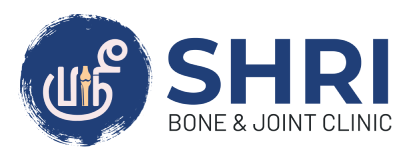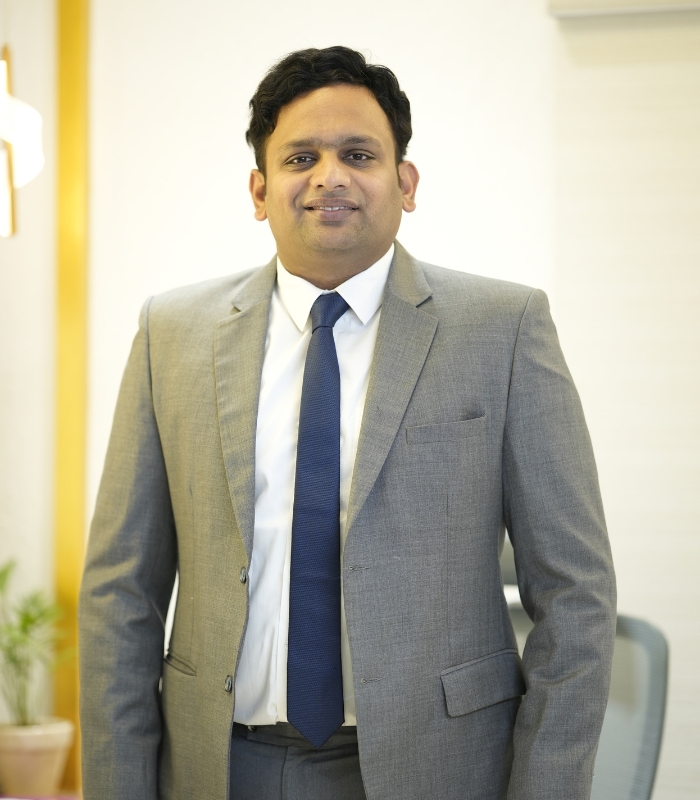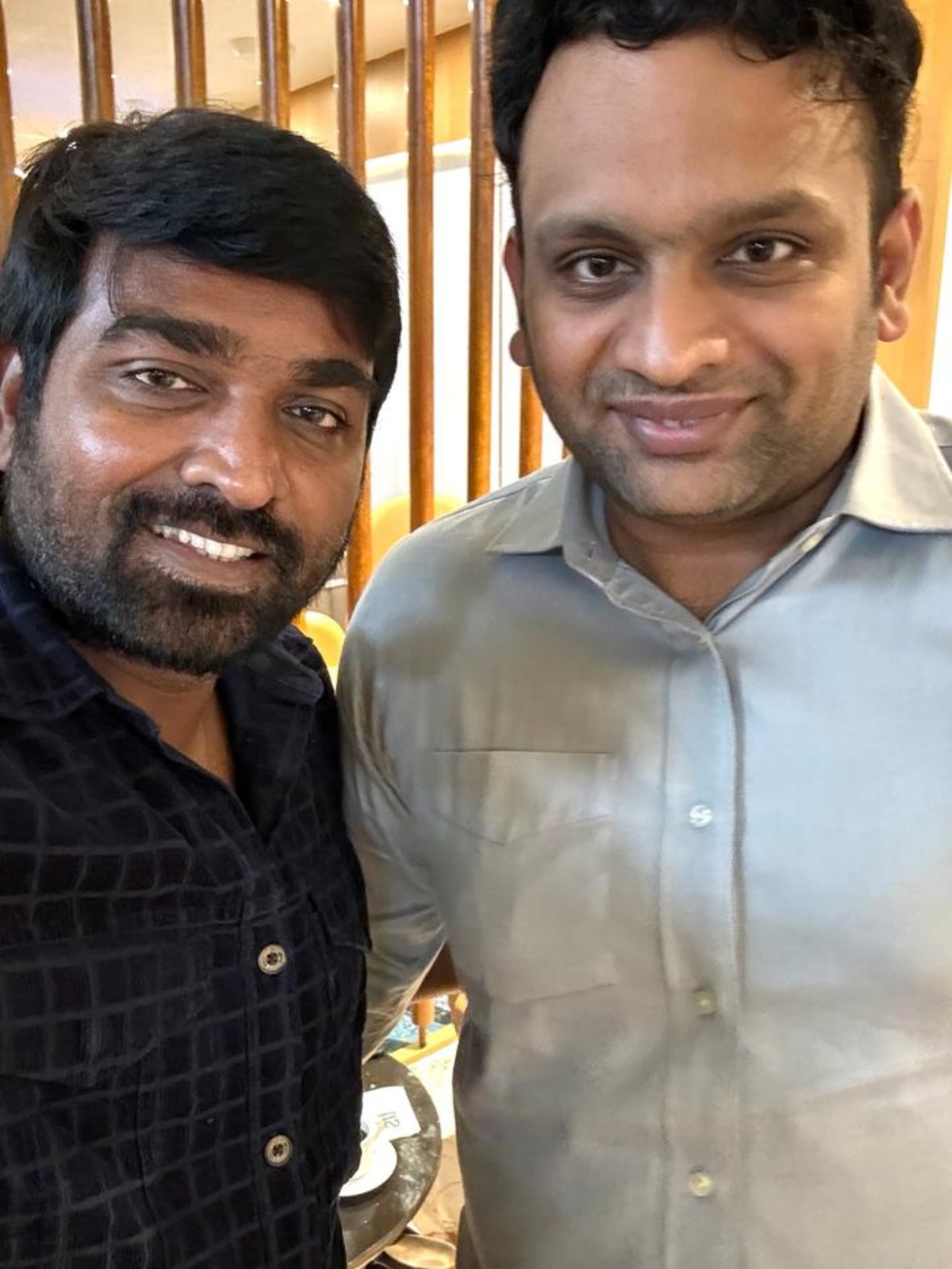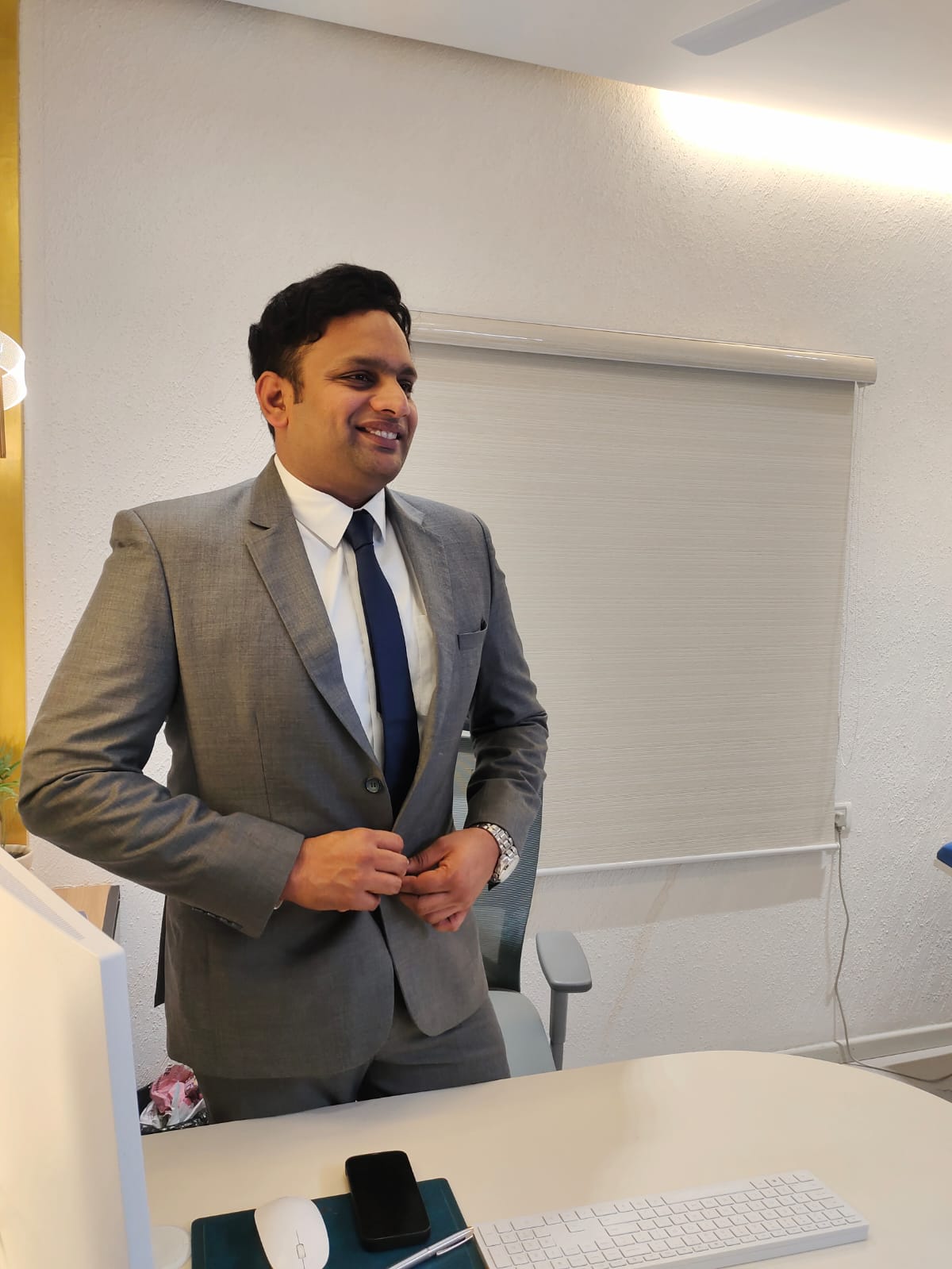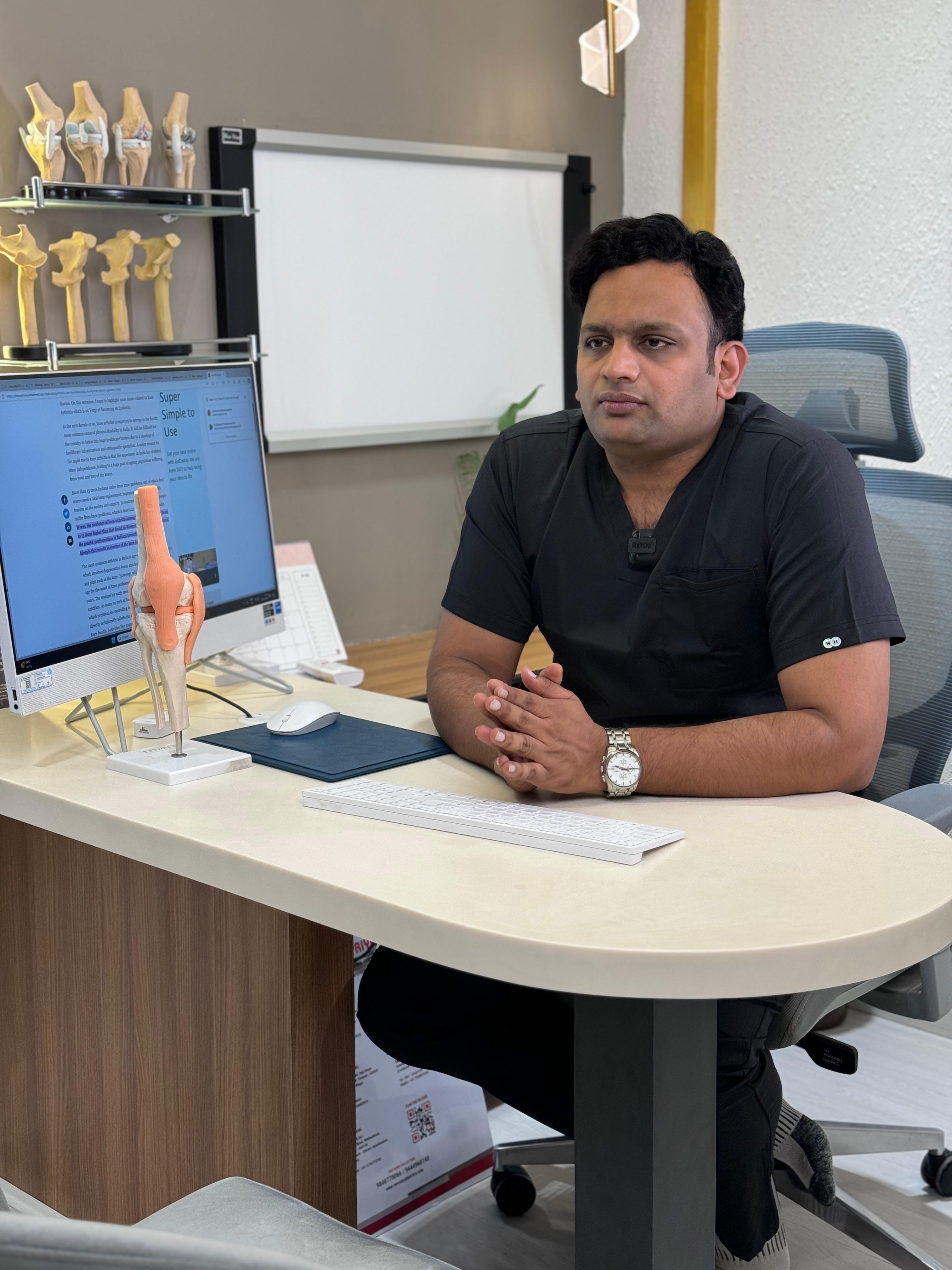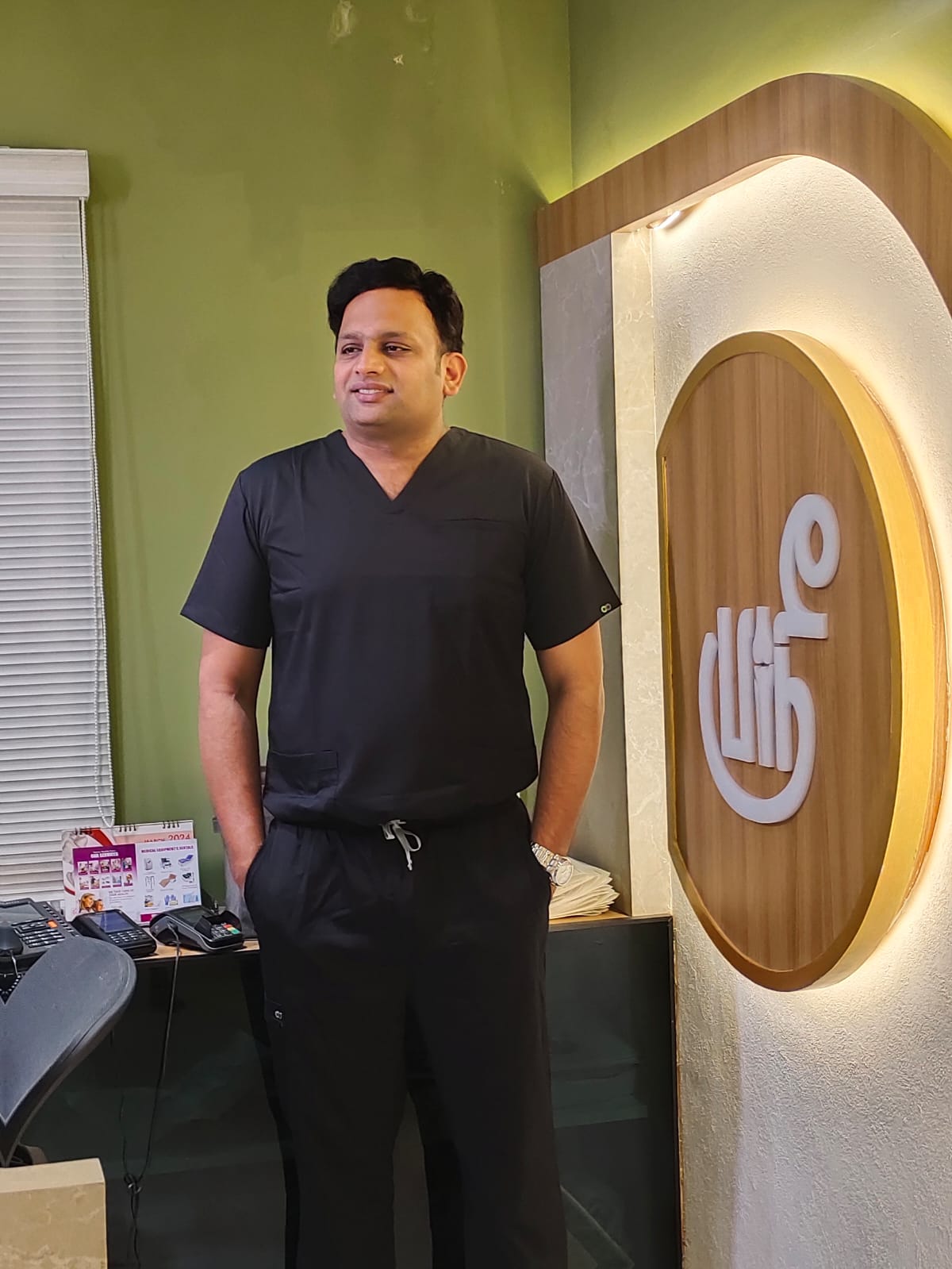What is Total Shoulder Replacement / Arthroplasty?
Total Shoulder Arthroplasty, also known as shoulder arthroplasty, is a surgical procedure where the damaged parts of shoulder joints are replaced with artificial components called prostheses. It is a major surgery, but it can be highly effective in reducing pain and improving functions in individuals with severely damaged shoulders.
The surgical procedure involves replacing the damaged parts of the shoulder with artificial components, which may include a metal ball attached to a stem that fits into the upper arm bone and a plastic socket implanted into the shoulder blade (glenoid).
The surgery is typically recommended for individuals with severe arthritis, irreparable rotator cuff tears, or other conditions significantly affecting the shoulder joints. Total shoulder replacement aims to restore mobility, reduce pain and improve overall joint function, allowing patients to regain a better quality of life.
Rehabilitation and physical therapy are crucial components of the postoperative process to help patients recover the strength, flexibility, and functionality in the shoulder joint after surgery. As with medical procedures, the decision to undergo total shoulder replacement is made based on the individuals’ specific medical conditions and a recommendation from a healthcare professional.
Indications for Total Shoulder Replacement
Osteoarthritis
The common reason where a cartilage wears down and causes pain and stiffness.
Rheumatoid Arthritis
An autoimmune condition that can lead to inflammation and damage to the shoulder joint.
Post-traumatic Arthritis
Arthritis that develops after a severe shoulder injury or fracture.
Rotator cuff tear Arthropathy
Severe rotator cuff tear causes arthritis and shoulder dysfunction.
Avascular Necrosis
Loss of blood flow to the bone head, causing bone death and collapse.
Severe Fractures
Complex fractures of the shoulder joint that cannot be adequately treated with other methods.
Failed Previous Shoulder Surgery
In cases where previous shoulder surgeries have not provided relief or have led to complications.
Osteonecrosis
Loss of blood supply to the humeral head can cause bone death and collapse, potentially requiring TSR.
Surgical Procedure
Anesthesia
The patient is placed under general anesthesia or a combination of public and regional anesthesia to ensure they are comfortable and pain-free during the procedure.
Incision
The surgery makes an incision on the front of the shoulder, exposing the damaged shoulder joints.
Glenoid Preparation
If the glenoid (shoulder socket) is also damaged, the surgeon may remove the damaged surface and attach the prosthetic glenoid components.
Humerus Preparation
The surgeon removes the arthritic or damaged head of the upper bone (Humerus) and prepares the bone to receive the humeral components.
Implant Placement
The artificial components are inserted. The humeral part typically consists of a metal stem with a ball attached, while the glenoid component may be plastic or metal. The details may be secured with cement or press-fit into the bone.
Closure
The incision is closed with sutures or staples, and a sterile dressing is applied.
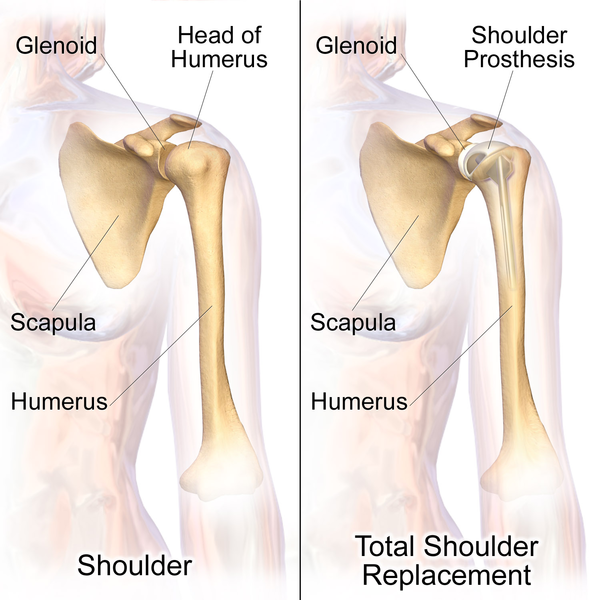
Rehabilitation and Recovery
First Four Weeks (Early stage)
-
Pain Management
Medications and physical therapy techniques help manage pain and swelling.
-
Sling use
You will like to wear a sling for a period to protect the joint and promote healing.
-
Passive Range of Motion Exercise
Your physical therapist will gently move the arm to prevent stiffness and maintain mobility.
-
Light Isometric Exercise
You will contract muscles without moving your arm to maintain strength.
Six to twelve weeks (progressive stages)
-
Gradually increase your active range of motion exercise
You will actively move your arm through a more extensive range of motion with the guidance of your therapists.
-
Strengthening Exercise
You will gradually start light strengthening exercises to build muscle strength and stability.
-
Functional Activities
You will begin practicing essential daily activities like reaching, dressing and bathing.
Three to six months (Last Stages)
-
Advanced strength and stretching
Exercise becomes more challenging to improve strength, flexibility and coordination.
-
Return to specific activities
With your therapist’s guidance, you can gradually resume recreational activities and sports, modified as needed.
Risks and Complications
Like significant surgical intervention, total shoulder replacement carries potential risks and components. While the procedure is typically safe and successful, it is crucial to be informed about these potentialities before deciding to proceed.
General Risks
- Although rare (1 to 2%), infection is a serious concern, necessitating prompt treatment with antibiotics and possibly additional surgical intervention.
- Blood clots, such as deep vein thrombosis (DVT) in the legs and pulmonary embolism (PE) in the lungs, can occur despite preventive measures.
- Nerve Damage during surgery may result in numbness, weakness, or pain in the arm or shoulder.
- Excessive bleeding during or after surgery may necessitate a blood transfusion.
- An allergic reaction occurs due to anesthesia or medications administered during surgery.
Specific Complications of TSR
- Loosening of implants over time can lead to pain and instability as the artificial components may detach from the bone, potentially necessitating revision surgery.
- Stiffness, characterized by a restricted range of motion and the possibility of developing frozen shoulders, may persist despite undergoing rehabilitation.
- Instability may occur, leading to potential dislocation of the replaced joint, necessitating manipulation or additional surgical intervention.
- Fractures in the bone surrounding the implant may occur during surgery or late due to falls or trauma.
- Wear and tear may occur as implant materials degrade over time, possibly necessitating replacement in the future.
- Cosmetic concerns, including visible scarring and minor variations in shoulder appearance, may be possible outcomes.
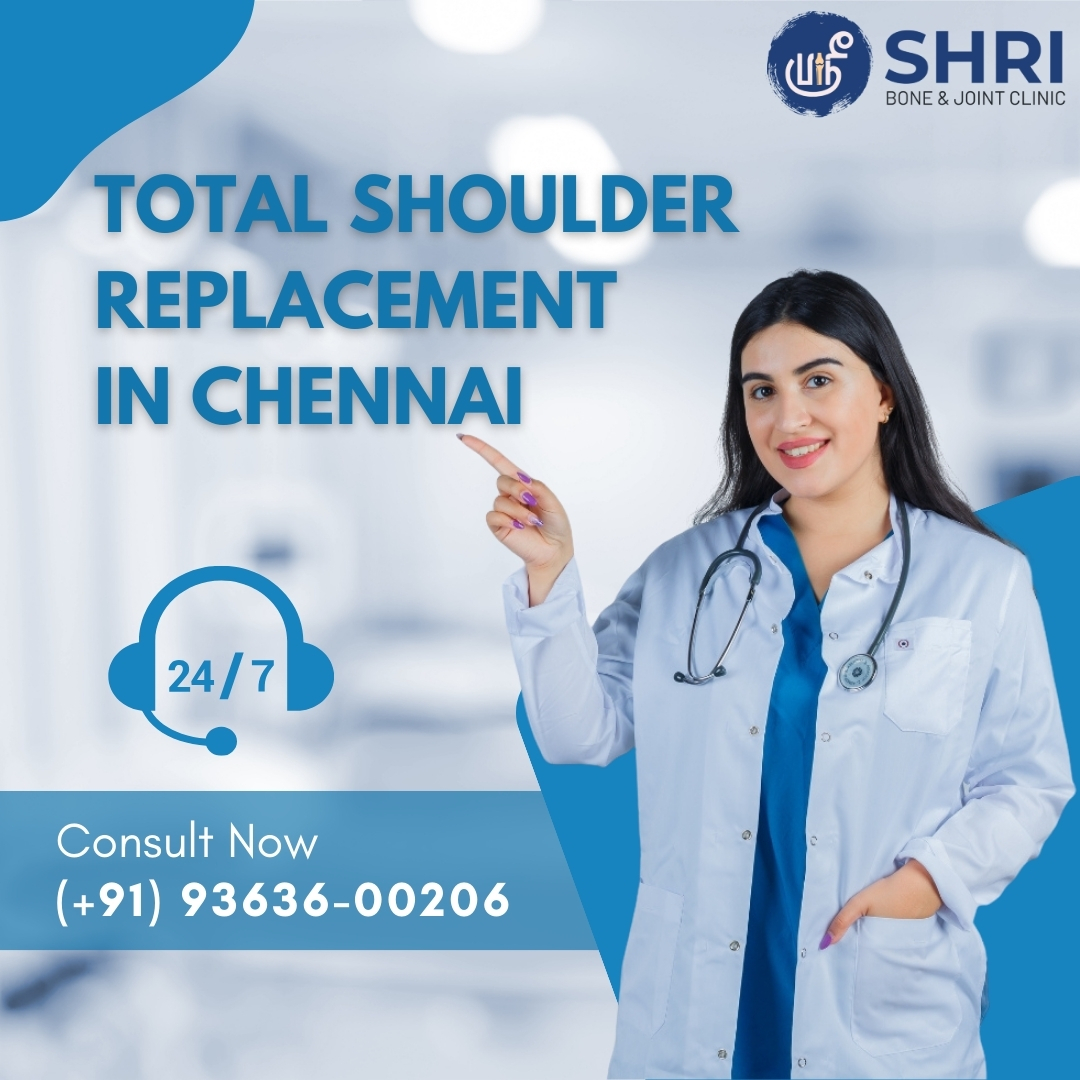
Total Shoulder Replacement Surgery Cost in Chennai
The total shoulder replacement cost range in Chennai is from Rs 3,40,000 to Rs 4,50,000.
Best Surgeon for Total Shoulder Replacement / Arthroplasty in Chennai
Dr Shriram Krishnamoorthy is the best surgeon for Total Shoulder replacement from Shri Bone & Joint Clinic in Chennai. He has over ten years of experience in this field.
He is a national board certified orthopedic surgeon. He is passionate about knee and shoulder injuries. He has been a part of 1000 knee replacements in Fortis Malar Hospital.
Best Hospital for Total Shoulder Replacement / Arthroplasty in Chennai
Shri Bone & Joint Clinic is the best hospital for Total Shoulder arthroplasty in Chennai, Tamil Nadu. You can get the best treatment for total shoulder replacement at an affordable and minimal medical charge from us.
Shri Bone & Joint Clinic provide the at most care for all who visit in for the treatment regarding knee- related problems. You are welcome to visit us at any time, as we are available 24/7, and you can call us in advance to check the doctor’s availability.
Appointment requests for the patient are scheduled on the same day, subject to the doctor’s availability. Emergency walk-in patients receive equal priority as those with scheduled appointments.
Seek prompt relief for knee-related issues at Shri Bone & Joint Clinic in Chennai. Our mission is to provide superior healthcare for your well-being.
Is shoulder replacement surgery worth it?
Yes, shoulder replacement surgery is worthwhile, offering pain relief, improved mobility, and enhanced function for better quality of life.
What is the revision rate for total shoulder arthroplasty?
The total shoulder replacement costs range from Rs 3,40,000 to Rs 4,50,000. You can get the best treatment at an affordable price from Shri Bone & Joint Clinic.
What is the life of total shoulder replacement?
The lifespan of a total shoulder replacement varies, typically lasting 15-20 years or more. Factors such as patient age, activity level, and implant type influence the longevity of the replacement.
Is shoulder replacement a high-risk surgery?
While shoulder replacement surgery has risks like infection and nerve damage, it is generally considered safe. The level of risk depends on individual health factors and surgical complexities.
Better Health Care is Our Mission
Phone
Shri Bone & Joint clinic
No.14/31, 3rd Avenue Indira Nagar, Adyar, Chennai-600020
Phone: 044 4505 5509
